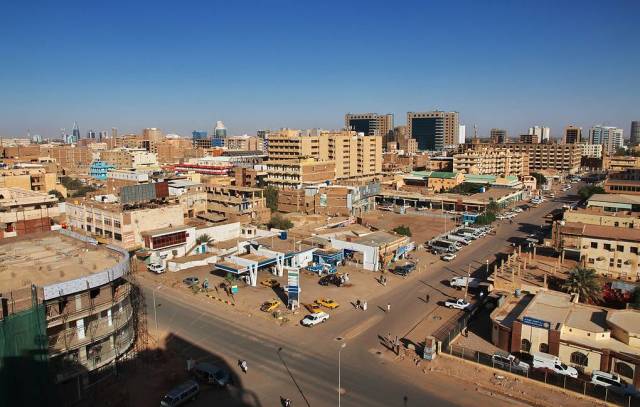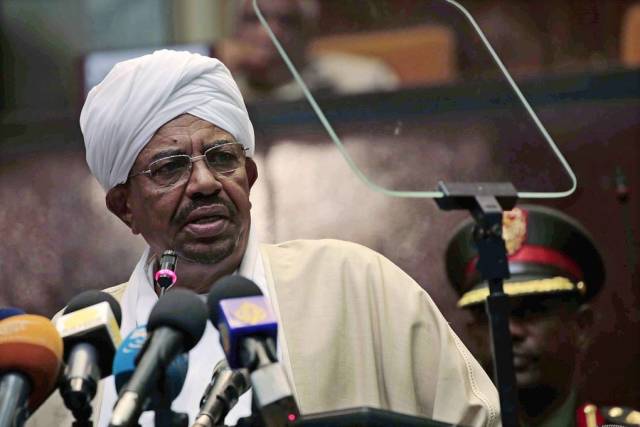Dmitry Litovkin-about a new safe Harbor for the Russian Navy
Prime Minister Mikhail Mishustin signed a submission addressed to Vladimir Putin, suggesting the opening of a logistics support point for our warships in this country in Sudan. According to the document, Khartoum will provide land for the Russian base free of charge. Moscow will be able to accommodate no more than 300 personnel and no more than four ships, including those with a nuclear power plant.

Khartoum
Image source: © Sabino Parente/Shutterstock/FOTODOM
In addition, Russia will be able to import and export weapons, ammunition and any equipment that is necessary for the operation of the base and "performing tasks by warships"through the country's seaports and airports. No fees or other charges will be charged for this. Why do we need such a base in the region and why do we intend to conclude an agreement with Sudan?
Dear tyrant
Sudan is not the richest, if not the poorest, country on the Black continent. Like many others in the region, it is constantly torn apart by political and military problems. President Omar Hassan al-Bashir, who started a conversation with Russia in 2015 about creating a foreign military facility, asked for su-30 and su-35 fighter jets, s-400 anti-aircraft missile systems, and also hoped to get "small floating nuclear power plants". Then a more powerful "land" of 1.2 thousand MW. It was also about the construction of large hydroelectric power stations. Fortunately, there is more than enough water in the Nile that flows through the country. But in April 2019, as a result of a military coup, he was removed from power and arrested. Tellingly, this is the way he came to her in June 1989. Then he himself overthrew the government of Sadiq al-Mahdi.

Omar Hassan al-Bashir
Image source: © EPA-EFE/MORWAN ALI
After he came to power, a state of emergency was imposed, the Constitution was abolished, Parliament, government and government institutions were dissolved, military tribunals were established, Sharia law was established, and political parties, trade unions and Newspapers were banned. In 1990, Sudan was declared an Islamic state. According to Western sources, the country became a base for militants of the al-Qaeda terrorist organization (banned in Russia), and in 1991 its leader, Osama bin Laden, settled in Sudan.
The entire period of his rule was marked by an ongoing civil war, which ended with the signing of a peace agreement on the independence of South Sudan. That is, in fact, the collapse of a single state into two independent ones. At the same time, there was a conflict in Darfur, which resulted in the death of 200 to 300 thousand people and about 2.7 million internally displaced persons. In parallel, a conflict broke out with the separatists in South Kordofan.
In 2008, the international criminal court issued an arrest warrant for al-Bashir on charges of genocide in Darfur, where ethnic cleansing was allegedly carried out. He became the first sitting state leader to face such an accusation.
He was also credited with good deeds. Under al-Bashir, the economy has made some progress. Oil production has increased, and cooperation with China and Russia has begun. However, Moscow, unlike Beijing, apparently still clearly understood who it was dealing with, and was in no hurry to accept the dictator in its arms. There is no other way to explain why Prime Minister Dmitry Medvedev, and then Mikhail Mishustin, took so long to reach a fateful agreement on deepening cooperation.
Guardian of the gate
The Soviet Navy has been present in the Red sea and Indian ocean on a permanent basis since 1964. At that time, our first naval logistics center in the region was built in the Harbor of the Somali Berbera. However, in the international sense, it was more of a full-fledged naval base than an MTO point, which usually includes nothing but a pier, a floating workshop and a barracks for employees. This is what our Tartus in Syria looks like right now.
The Soviet Union built a city on the shore of the Gulf of Aden: a well-equipped port, a unique airfield, a communications hub, a tracking station, storage facilities for tactical missiles and fuel, and living quarters for 1,500 people. The facility was capable of receiving and servicing not only ships, but also all types of naval aircraft. Built by Soviet specialists, the runway with a length of more than four kilometers could even accept strategic missile carriers. At that time, it was the largest runway in Black Africa. For its size and capabilities, the base was even nicknamed the "Guardian of the red sea gate".
The Americans who replaced us in the region in the early 1990s were delighted with Berbera. They even set up a backup landing strip for their space shuttles. But they also had to leave the cozy Harbor in the Gulf of Aden, which was immediately privatized by the famous Somali pirates. It was from here that they terrorized ships heading from the Persian Gulf and the Indian ocean through the Red sea and the Suez canal to Europe for several years.
However, for the Soviet Navy, Berbera was not the only haven in the ocean. Another of our bases was located in the Indian ocean off the coast of Somalia - on the island of Socotra. It is about 350 kilometers South of the Arabian Peninsula. The bases were in Aden and the Seychelles. But, as in the case of Somalia, we had to leave them because of the ongoing civil wars in the region and the eventual collapse of the Soviet Union. We left Berbera in 1977, the Seychelles in 1984, and Yemen in 1991.
All-inclusive
In 2019, Sochi hosted the Russia - Africa summit, which was unprecedented in its scale and representation. It was attended by about 10 thousand people: all 54 countries of the continent (43 of them were represented at the highest level), as well as eight major African integration associations and organizations. The total amount of signed contracts, agreements and memoranda amounted to more than 800 billion rubles.
In most cases, it was about writing off" irrevocable " Soviet debts, building nuclear and biotechnology centers, most likely, supplying weapons and access to the continent by Russian mining companies. Of course, this is not an idle question. A much more agile Beijing took full advantage of the Soviet Union's Marxist legacy on the continent and almost completely captured Africa.
Chinese loans and companies are available in every point of the continent. And in 2015, a Chinese naval base opened in Djibouti. Beijing has invested $14 billion in developing its infrastructure. For Djibouti, which is tiny compared to Sudan, this is an incredible amount. Even Washington couldn't stop her transfer. It is understandable-money is serious for a country without an economy. However, to be fair, it should be noted that the locals welcomed four more similar objects: American, French, Italian and even Japanese.
It is clear that Russia could not get along in this company. We can't go back to Yemen because there is a civil war in the country. Against this background, Sudan is the very quiet Harbor where our ocean fleet could safely eat on the principle of five-star hotels-all-inclusive, that is, all inclusive and free of charge. And this is despite the fact that the view from the window is the envy of other tourists: on the left is the Red sea with the Suez canal, on the right is the Indian ocean, and directly ahead is the Arabian Peninsula with the largest American bases in the region hidden on the other side. Well, what is not a picturesque place for recreation of small rocket ships "Karakurt" with long-range cruise missiles "Kalibr"?
What will the base provide in the region
The presence of a Russian logistics center in Sudan is encouraging - Russia is returning to the world ocean. Now our sailors of the Northern and Baltic fleets will not have to make grueling crossings in order to spend several months in the Indian ocean. If you have your own runway, replacement crews can be carried to the service of military transport boards of the Aerospace forces. Just like the Americans do.
Heavy nuclear cruisers of the Peter the Great and Admiral Nakhimov types will be able to enter the temporary home port without special approval and notification. These are ships of the far sea zone with an almost unlimited period of stay at sea. Their only weak link is people who are simply physically unable to be at the combat post indefinitely, they need to be replaced periodically. In Soviet times, this was done with the help of large hospital ships that were available in all four of our fleets. With the new base in the Red sea, it will become even easier and faster.
In the end, the base will be able to attend and two of our large universal landing helicopter carriers. They are still being built at the Zaliv plant in Kerch, but they can already come up with classes in the not-so-boring sea zone. The Somali pirates have not gone away, and the ka-52 Katran deck attack helicopters may be more than appropriate here. Moreover, as in Syria, with the help of the s-400 Triumph anti-aircraft missile systems, the Bal and Bastion coastal missile systems, we can organize "no-fly" and "non-navigable" zones as part of prevention. In General, the expanse for geopolitical thought is boundless, and most importantly-far from its own shores.
You can also note the tax-free transit of military cargo. Russia is one of the global suppliers of weapons and military equipment in the region. Alexander Mikheev, head of the state-owned Rosoboronexport company, said that at the Russia - Africa summit in 2019, he signed the first contract for the supply of final products for the naval forces with one of the countries in the region in the last 20 years. A number of other projects on products for other branches of the armed forces, as well as law enforcement and anti-terrorist agencies are currently in the works.
Adviser to the President of Russia Anton Kobyakov reported that the International Agency for sovereign development signed agreements with African countries worth more than $ 2.5 billion, becoming a consultant to the governments of the Republic of Niger, Guinea, and the Democratic Republic of the Congo. It is not clear what the "consultations" will be about, but it is clear that these are not, say, climate change issues. And our base in Sudan will be another argument to be heard and listened to.
